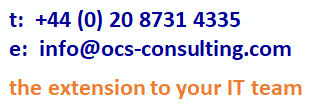| Application | Cloud |
| SQL Server | Database Services |
| Business Objects | Sybase |
| Legacy | IT Infrastructure |
| UNIFACE, ADABAS/Natural |

What is Legacy?
In general the term legacy is given to a technology, an IT system or an application that is considered outdated or unsupported and potentially in need of replacing. Most organisations will have systems and applications that although business critical have become legacy. However, these legacy systems and applications are also central to one or more business services and it’s not always possible to introduce a replacement, therefore it is important that they are still maintained and supported.
Legacy System and Software Challenge
IT departments react to business drivers; investing in and gaining new skills and experiences in order to secure software, facilities, and shape IT architecture for future IT platforms. As IT knowledge progresses, it becomes increasingly difficult to retain the skills and experiences needed to maintain established systems based on legacy software. Although the IT architecture, software, and implementation methods may be obsolete, these established frameworks and their applications continue to provide valuable services to their business communities, often business critical and underpinning modern frontline application services and systems. These legacy systems retain their business value, but a skills gap is widening within IT departments.
Legacy System and Application Support
For many organisations outdated Legacy Systems and Applications are undesirable and unsupportable within their business' IT departments. The most common catalyst for organisations to outsource the support of legacy systems is being orphaned by new IT architectures and new enterprise platforms, such as occurs with business mergers and acquisitions. OCS Consulting plc has a proven track record in supporting Legacy Systems and Applications. Being an IT service provider for more than 35 years OCS has provided BAU support to organisations who have turned to OCS to outsource their legacy systems and applications.
Some of the technologies OCS is maintaining within Legacy Systems and Applications are: Java, SEAM, Swing, Struts, Ruby, PowerBuilder, Progress 4GL, PHP, RPG, VB6, VBA, VB.NET, ASP.NET, UNIFACE, Delphi, Informix 4GL, Access, SQL Server 2000, Sybase and Oracle
What to do with Legacy Systems and Applications?
What is a given, is these Legacy Systems and Application must continue to work. They are delivering business services, adding value and meeting business needs. The technology may be legacy, the business services may be maturing, the skills and experiences required to sustain may become less available and there may be a timetable for decommissioning, yet today they need to work. Therefore, a support capacity is required:
- Internal IT: struggle to retain resources due to limited future value in the legacy skillsets, or become dependent on freelancers that need to be managed
- External IT: needs to be based on a Service rather than capacity, where "ownership" can be shared or even transferred. Need to have capability to ensure value is sustained within the Legacy Systems and Applications and the business can continue to derive value from integration with new systems and platforms as and when desired.
Maintenance and Support of Legacy Systems and Applications
Over three decades of custom application development and support provides OCS with a pedigree ideally suited to legacy technologies, frameworks and methodologies. High OCS employee retention within the consultant pool secures technical specialists who are proficient with current technologies, yet, retaining knowledge and skills of past technologies and implementation variations.
Further, OCS seeks out multi-talented employees when recruiting, who bring further technical depth and capability. Our consultants are the kernel of our Legacy Systems and Application Support Services.
So if you're thinking about how to maintain and support your Legacy Systems and Applications, then email info@ocs-consulting.com or phone 020 8731 4335.

